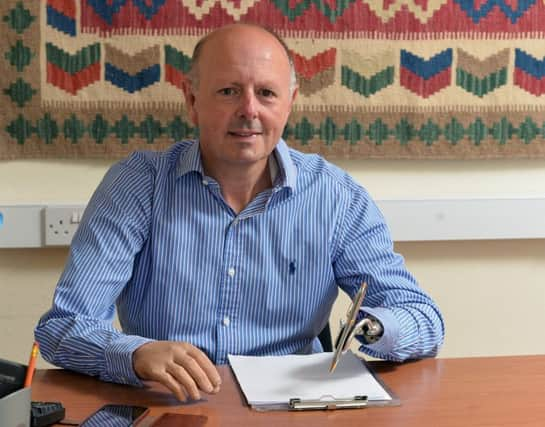IRA survivor's warning on veteran suicides


Dr Michael Paterson OBE, a former RUC officer who lost both arms to a rocket propelled grenade (RPG) fired by the IRA, gave his view to the Johnston Press Investigations Team as part of our probe into UK veteran suicides.
Dr Paterson was an RUC officer on patrol in Belfast in 1981 when the RPG cut through his Land Rover, killing his colleague and destroying both his arms.
Advertisement
Hide AdAdvertisement
Hide AdChanging career path to become a psychologist, he went on to treat police and army veterans of the Troubles for related mental disturbances such as Post Traumatic Stress Disorder (PTSD).
Veterans charity Combat Stress has told JP Investigations that over the past decade veteran suicide rates have significantly risen in America and other NATO countries in the past 10 years .
In the US, veterans were 2.1 times more likely to die by suicide than civilians in 2015.
Canadian figures from 1976 to 2012 found male veterans were 1.4 times more at risk of suicide than civilians.
Advertisement
Hide AdAdvertisement
Hide AdMeanwhile in Australia the suicide rate from 2002–2015 was 14% higher among male veterans than civilian men.
The Ministry of Defence says it has no records to say what the rate is for UK veterans, or whether it is rising.
The last serious academic study on the matter was carried out in 2009, and found that the rate among veterans in the UK is about in line with the general population.
However Dr Paterson says it is more than likely that the UK is in line with the higher rates of the US, Canada and Australia.
Advertisement
Hide AdAdvertisement
Hide Ad“Unless they are doing something radically different in the UK with their ex-military, then the rate of mental health issues and probably suicide is likely to be much the same [as in those three countries],” he said.
In the 1980s he carried out a study of 200 RUC officers who had retired five years previously, which revealed that 14% of them had PTSD.
For about 20 years from 1998 onwards, Dr Paterson treated some 200 former police and army veterans for PTSD.
“About 25-30% of them would have had military service, some of them joining the police after their military service. Some of them served in Afghanistan,” he said.
Advertisement
Hide AdAdvertisement
Hide Ad“Easily” one quarter of those 200 clients would have felt that “life is not worth living”. But those with suicidal ideation – a category he defines as those with an actual plan to take their lives – would have been much less than that; “a small amount”.
He added: “People who do [take their lives] believe it is an escape from what they are going through. All of us are designed to remove discomfort of what we are going through.
“Someone with PTSD symptoms may feel they are causing trouble around people and isolate themselves, but then they miss out on social support.
“They may feel that killing themselves is the solution. But it is an irrational decision because they are being driven by a flight response.”
Advertisement
Hide AdAdvertisement
Hide AdThe hope offered by such therapists to those suffering PTSD is clear from the results for his patients.
“Thankfully none of the clients who I have worked with have gone on to kill themselves, certainly that I am aware of,” he added.
“Throughout the conflict a number of RUC officers ended their lives through suicide, and some factors which fed into this are still present in retired officers.
“For those who have served in the police, and others, living with the recurring nature of psychological trauma can and does drag one’s mood down.
Advertisement
Hide AdAdvertisement
Hide Ad“When this leads to sufferers considering ending their lives, it is a tragedy.
“An important first step is to consult one’s GP who can prescribe medication to help and make an onward mental health referral. In addition to psychiatric assessments, there are recognised effective therapies and skilled therapists available to help.” Dr Paterson’s website is www.trauma-stress.co.uk
• The News Letter has his personal story next week.
HELPLINE NUMBERS
UDR/RI aftercare: 90420145
UDR Ben. Fund: 90420652
Royal Irish Ben. Fund: 90420629
Veterans UK (MoD pensions/compensation): 0808 1914218
The Samaritans: 116123
Lifeline NI: 0808 808 8000
Alcoholics Anon: 0800 8177 650
Vets’ Gateway: 0808 802 1212
Combat Stress: 0800 138 1619
Help for Heroes: 01980 844280
Royal British Legion: 0808 802 8080
SSAFA: 080 731 4880
Soldiers Charity: 0207901 8900